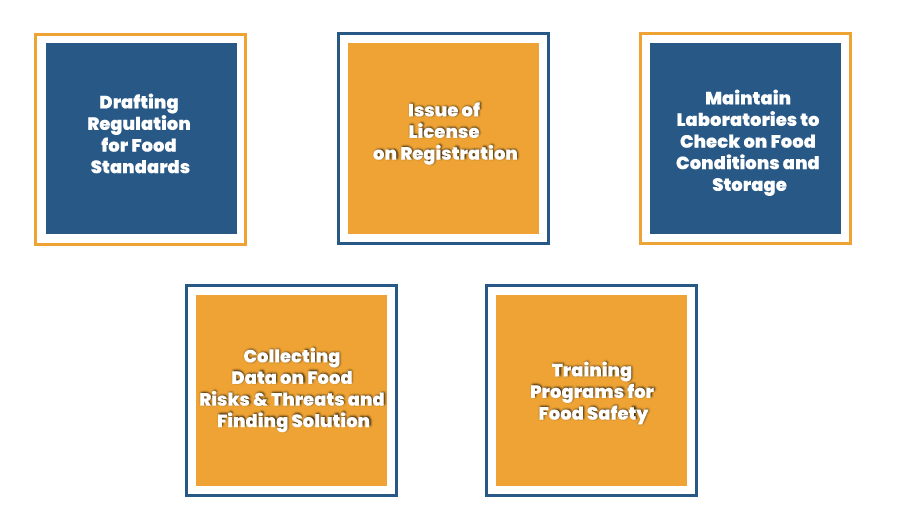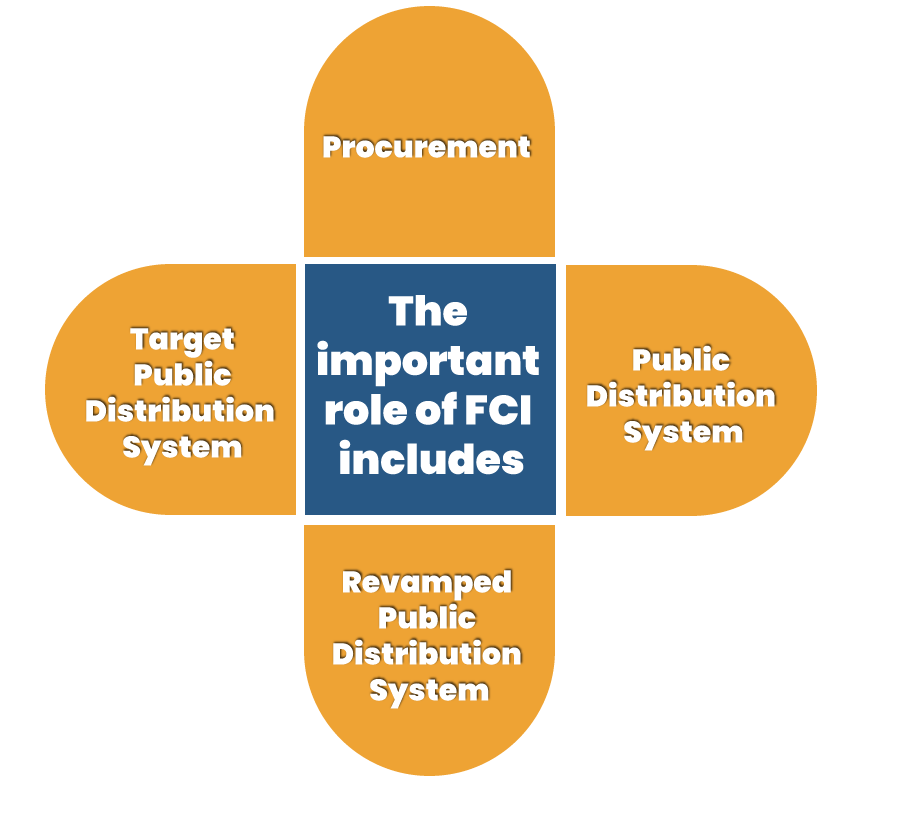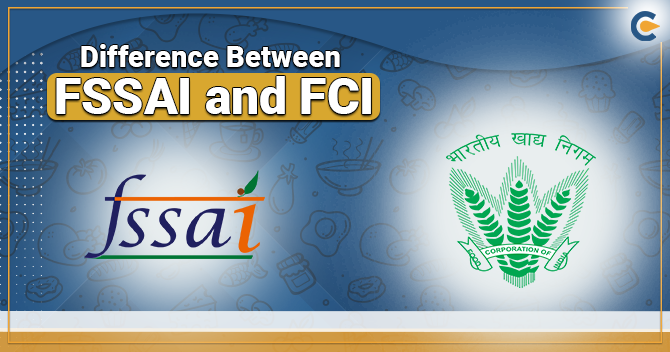Food Safety and Standards Authority of India (FSSAI) is an independent body which is working under the Ministry of Health & Family Welfare, Government of India. The authority is responsible to keep a check on the quality of food, constantly monitors and comes up with guidelines to ensure that the food is proper and safe for human consumption. It is established under the Food Safety and Standards Act, 2006.
Government of India created an organization called The Food Corporation of India (FCI). It is a statutory body formed under the Ministry of Consumer Affairs, Food and Public Distribution, established by the enactment of Food Corporation Act, 1964 by the Indian Parliament. Both FSSAI and FSI are working under Government of India and aims for food safety and security but here in this article we have elaborated the difference between FSSAI and FCI.
What are the Purpose of FSSAI and FCI?
The purposes of both the FSSAI and FCI are different but they together aim to serve the public with good food quality considering public health and life.
The purposes of FSSAI
- It is to ensure food safety and to be an authority that lawfully certifies food processing and food producing business.
- FSSAI is authorised to lay down many guidelines and standards which are science-based and focus on food safety of the individuals.
- FSSAI is authorised to come up with stringent guidelines for all the Food Business Operators to manufacture food considering food quality and hygiene conditions, proper storage and distribution and regulation of sales and import of the food which must be done by abiding with the guidelines.
- It is responsible for creating general awareness across the country about food security and safety standards.
The Purpose of FCI
FCI aims to ensure availability of adequate food stock. It was started following the Green Revolution pursuit of self-sufficiency in rice and wheat.
- Food Corporation of India aims for an effective price support operations to safeguard the interests of the farmers.
- To work for public distribution system and distribute food grains throughout the country.
- To maintain satisfactory level of effective and sufficient stocks of food grains to guarantee National Food Security.
- FCI has important role in transforming the crisis administration oriented food security into a stable security scheme. Few of which includes :-
- Provide farmers remunerative prices
- Make food grains available at reasonable prices for vulnerable sections of the society.
- Maintain buffer stocks of food to determine Food Security.
- Intervene in market for price stability.
Read our article:What is The Difference Between The FSSAI License and FSSAI Registration?
What are the Important Roles of FSSAI and FCI?
FSSAI and FCI both functions for food security but their different roles are given below. Role of FSSAI


- To draft regulation and lay down the Food Standard guidelines concerning safety and hygiene conditions of food articles and to ensure every appropriate action for implementing these guidelines.
- To render scientific support and assistance to Central and State Governments in the matters related with policies that have a direct or indirect bearing of food safety and nutrition norms.
- To authorise certification bodies and frame guidelines for providing certification and license to food business operators on registration.
- To maintain and make processes and strategy for the establishing authorised laboratories to scrutinise food quality, hygiene and storage conditions.
- To come up with training programs to persons involved in food businesses in India and spread awareness about the safety guidelines and measures to manufacture, store and distribute food.
- Collecting data on food risks & threats and finding solution for the same. To identify the food threats and introduce food alert system.
- To contribute in the expansion of international procedural and to follow international standards for food, phyto-sanitary and sanitary methods.
Role of FCI
The important role of FCI includes:


Procurement
The Central Government shall extend the price support for procuring paddy, wheat and coarse grains through FCI and other state agencies. The food grains have to be procured by the procurement agencies at the Minimum Support Price together with any incentives or bonus where the food grains are complying with the standards.
This can be done both either by a direct and indirect process. The “Decentralized Procurement Scheme” (DCP) and Targeted Public Distribution System (TDPS) by the State Government provides for storing, distributing and procuring of the food grains. There are several other welfare schemes laid down for procurement of food grains.
The DCP was launched to advance the effectiveness of procurement for the public distribution system and to endorse decentralized scheme in no-traditional states with an aim to save the losses in transport and other costs.
FCI is nominated as “Additional Agency for procurement of pulses and Oilseeds”. It is the Quality Control Division of FCI which ensures that the food grains are taken from the procurement centres as per the uniform quality standards of the Government of India.
Public Distribution System (PDS)
Both Central and State Government[1] is the responsible for managing and controlling the PDS. Distribution of food grains became very essential after the occurrence of food shortage in 1960 and because of this the public distribution system was introduced.
The purpose of PDS is to control and manage the rise in prices of food grain and check the accessibility of food to the every people. Essential basic food commodities like wheat, salt, sugar, rice, kerosene, are being provided to the State govt for the distribution of the same to the needy under the public distribution system.
Revamped Public Distribution System (RPDS)
The Revamped Public Distribution System was introduced in June 1992. The main purpose of bringing this scheme was to strengthen the already available PDS and to advance its availability in the rural and remote areas so as to ensure its reach to the underprivileged and the poor section of the society.
Target Public Distribution System (TPDS)
Due to the failure of the PDS system to provide food distribution to the targeted needy individual this system was introduced in 1997. TDPS aims to grant benefit to the poor sections of the society and manage the budgetary food subsidies.
Its function it to grant the availability of the food grains to the individuals below the poverty line at a very lower and subsidised rate as compared to the PDS and food grains that are available to the people above the poverty line at a higher price. Thus, TDPS serves the purpose of PDS but in a more focused way to the people below the poverty line.
Conclusion
FSSAI and FCI are both working for food management and security mechanism. Where the FSSAI regulates the safety conditions of food, the FCI ensures the availability and distribution of good quality of food grains to poor sections of the society.
Thus, although both FSSAI and FCI deal with food businesses they both have different roles to perform. The responsibility of both the Government authorised body FSSAI and FCI has become more crucial since the outbreak of covid-19 outbreak. Therefore, they both have become alert in performing their function for safeguarding the public health and safety.
Read our article:Renew FSSAI License – When and How to Do it!











